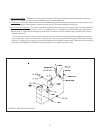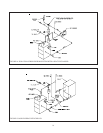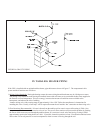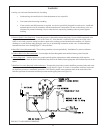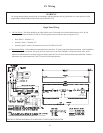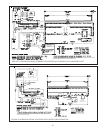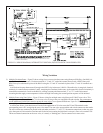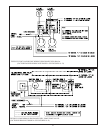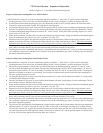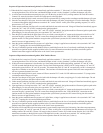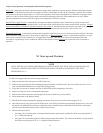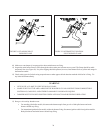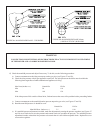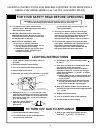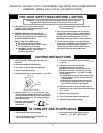
24
23
CWI Control System – Sequence of Operation
(Refer to Figures 18 - 21 for ladder and connection diagrams)
Sequence of Operation, Standing Pilot, Less Tankless Heater
1) When the boiler is energized, 24 volts is immediately applied to terminals “1” (blue) and “4” (yellow) on the vent damper.
Assuming that there is no call for heat, and that the damper switch is in the “automatic” position, the damper will close.
2) A call for heat from the thermostat energizes relay coil 1R (the relay on the L8148E), causing contacts 1R1 and 1R2 to make.
Contact 1R1 starts the circulator. Contact 1R2 sends power to the high limit.
3) Assuming that the high limit is made, current will flow to pin terminal #2 (orange) at the vent damper and the damper will open.
4) Once the vent damper is fully open, an end switch inside the damper will make, energizing pin #3 (red) at the damper. This pin
is connected through the damper harness to terminal “B1” on the L8148E. At this point in the operating sequence, 24 volts is
present across “B1” and “B2”.
5) Under normal conditions, the flame roll-out switch and blocked vent switch are made. Voltage will therefore immediately appear
across the combination gas control (“gas valve”) terminals “TH” and “TR”.
6) When the boiler is first placed into operation, the pilot must be lit. The pilot heats a thermocouple which generates a small
amount of electricity sufficient to hold open the safety shut-off valve in the combination gas control.
The circuit connecting
the thermocouple and the safety shut-off valve is self contained and completely independent of all other wiring on the boiler.
This safety shut-off valve is upstream of the 24 volt valves in the gas control which open in response to a call for heat. If the
pilot is not lit, the safety shut-off valve will remain closed and gas will not reach the 24 volt valves.
7) Assuming that the pilot is established and proven by the thermocouple, the application of 24 volts across the combination gas
valve terminals energizes the redundant 24 volt solenoid valves in the combination gas control, resulting in gas flow through
the control and burner operation.
Sequence of Operation, Standing Pilot, With Tankless Heater
1) When the boiler is energized, 24 volts is immediately applied to terminals “1” (blue) and “4” (yellow) on the vent damper.
Assuming that there is no call for heat, and that the damper switch is in the “automatic” position, the damper will close.
2) If the boiler water temperature is less than the low limit setting minus the differential setting, terminals “R” and “B” in the
L8124E are made through the low limit switch. The low limit switching action is SPDT with “R” being common. “R” and “W”
are therefore open whenever “R” and “B” are made. This means that while “R” and “B” are made relay coil R1 is deenergized,
regardless of whether or not there is a call for heat. The circulator will therefore not operate if the boiler water temperature is
too low to generate domestic hot water.
3) Assuming that the high limit is made, current will flow to terminal “B1” on the L8124E and then to terminal “2” (orange) at the
vent damper and the damper will open.
4) Once the vent damper is fully open, an end switch inside the damper will make, energizing pin #3 (red) at the damper. The red
wire from this pin runs to the flame rollout switch.
5) Under normal conditions, the flame roll-out switch and blocked vent switch are made. Voltage will therefore immediately appear
across the combination gas control (“gas valve”) terminals “TH” and “TR”.
6) When the boiler is first placed into operation, the pilot must be lit. The pilot heats a thermocouple which generates a small
amount of electricity sufficient to hold open the safety shut-off valve in the combination gas control. The circuit connecting
the thermocouple and the safety shut-off valve is self contained and completely independent of all other wiring on the boiler.
This safety shut-off valve is upstream of the 24 volt valves in the gas control which open in response to a call for heat. If the
pilot is not lit, the safety shut-off valve will remain closed and gas will not reach the 24 volt valves.
7) Assuming that the pilot is established and proven by the thermocouple, the application of 24 volts across the combination gas
valve terminals energizes the redundant 24 volt solenoid valves in the combination gas control, resulting in gas flow through
the control and burner operation.
8) The boiler will fire until the boiler water temperature is approximately equal to the low limit setting. Once the water temperature
reaches this point, “R” and “B” open and “R” and “W” make. At this point, a call for heat will energize 1R, making contacts
1R1 and 1R2. Contacts 1R1 energize the circulator. Contacts 1R2 switch current from the “hot” side of the transformer second-
ary to the high limit switch. If the high limit is made, current flows to terminal “B1” and the ignition sequence is then the same
as it is for a call for burner operation from the low limit (see (3) above).



